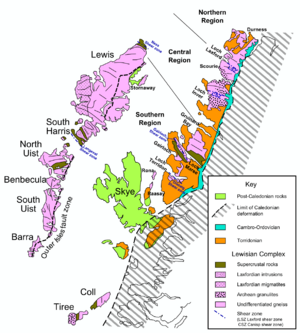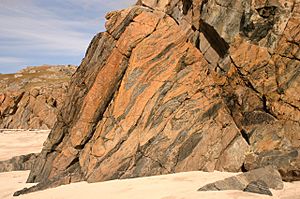Hebridean Terrane facts for kids
The Hebridean Terrane is a special part of the Earth's crust found in northwest Scotland. It's like a huge, ancient puzzle piece that makes up much of the land there. This terrane is part of a much larger area called the Caledonian orogenic belt, which was formed when continents crashed together long, long ago.
The Hebridean Terrane is separated from its neighbor, the Northern Highland Terrane, by a major geological boundary called the Moine Thrust Belt. Think of it as a giant seam where two different parts of the Earth's crust meet.
Contents
What is the Hebridean Terrane?
The Hebridean Terrane is basically the western edge of mainland Scotland. It also includes most of the Inner Hebrides and all of the Outer Hebrides islands. Scientists believe similar rocks are also found on Shetland and even under the sea to the west and north of the Outer Hebrides.
Geologists have explored these areas using special boreholes and drilling for oil. This helps them understand how far this ancient land piece stretches. The full size of the Hebridean Terrane to the west is hidden by changes that happened millions of years ago when the land started to pull apart.
Ancient Rocks of the Hebridean Terrane
The very oldest rocks in the Hebridean Terrane are called the "basement rock." These are incredibly old gneisses, which are a type of rock that has been changed by heat and pressure deep inside the Earth. Some of these rocks formed during the Archaean eon, over 2.5 billion years ago! Others are from the Palaeoproterozoic era, which is still billions of years old. These ancient rocks are part of what's known as the Lewisian complex.
Younger layers of rock were laid down on top of these ancient gneisses. These new layers didn't fit perfectly, creating what geologists call an "unconformity." Imagine stacking new books on top of old, uneven ones.
One of these younger layers is made of Neoproterozoic sediments, which form the Torridonian rocks. These are often reddish sandstones. Even younger sediments from the Cambro–Ordovician periods were then laid down on top of the Torridonian rocks, also unconformably.
How the Terrane Formed
The Hebridean Terrane played an important role during the Caledonian continental collision. This was a massive event where continents slowly crashed into each other, forming huge mountain ranges. The Hebridean Terrane was part of the "foreland" of Laurentia, which was an ancient continent that included much of North America and Greenland. It was like the front edge of this giant landmass as it moved and collided with other continents.
The Caledonian Orogeny was a long period of mountain building that shaped much of Scotland's geology. The rocks of the Hebridean Terrane show us clues about these incredible forces that changed the Earth's surface over millions of years.
Images for kids
-
Well-bedded Torridonian sandstone
 | George Robert Carruthers |
 | Patricia Bath |
 | Jan Ernst Matzeliger |
 | Alexander Miles |






